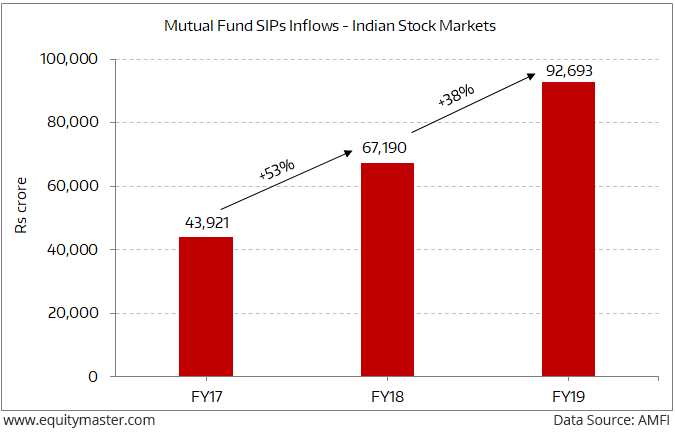India's Third Giant Leap
This Could be One of the Biggest Opportunities for Investors
- Home
- Todays Market
- Indian Stock Market News September 17, 2019
Sensex Opens Over 100 Points Down; Banking and IT Stocks Under Pressure Tue, 17 Sep 09:30 am
Asian share markets are lower today as Chinese and Hong Kong shares fall. The Shanghai Composite is off 0.9% while the Hang Seng is also down 0.9%. The Nikkei 225 is trading lower by 0.1%. Meanwhile, energy stocks spiked while most of Wall Street fell on Monday after weekend attacks on Saudi Arabia's oil facilities added to investors' concerns about geopolitical risk and a stumbling global economy.
Back home, India share markets opened lower. The BSE Sensex is trading down by 104 points while the NSE Nifty is trading down by 30 points. The BSE Mid Cap index and BSE Small Cap index opened up by 0.1% and 0.2% respectively.
Sectoral indices have opened the day on a mixed note with oil & gas stocks, IT stocks and bank stocks witnessing selling pressure. Consumer durables and metal stocks have opened the day in green.
The rupee is currently trading at 71.56 against the US$.
Logging its first fall in eight sessions, the Indian rupee on Monday plunged by 68 paise to 71.60 against the US dollar amid concerns over soaring crude prices following drone attacks on Saudi Arabia's oil facilities.
Surging crude oil prices have emerged as major fears for India in form of fiscal slippage and inflationary pressure.
Crude oil prices saw their biggest intraday gain on Monday, soaring nearly 20%. The attacks on Saudi Aramco's oil facilities removed almost 5% of global supply.
They also heightened geopolitical tensions, which may now keep oil prices inflated.
Higher prices will add to the pressure on the Narendra Modi administration, grappling with the slowest economic expansion in six years.
India is among the most vulnerable to rising oil prices given its overwhelming dependence on imports, mainly from West Asia.
Moving on to the news from the mutual funds space. The mutual fund industry managed to garner Rs 82.3 billion through systematic investment plans (SIPs) in August, a rise of 7.5% from the year-ago period, despite volatility in equity market.
With this, total SIP contribution in the first 5 months of the current fiscal rose to Rs 411 billion as compared to Rs 367.6 billion in April-August 2018, as per the Association of Mutual Funds in India (AMFI).
SIP continued to be the preferred route for retail investors to invest in mutual fund as it helps them reduce market timing risk, the reports noted.
Inflows into SIPs have averaged about Rs 80 billion for the 12 months till August.
The chart below shows the trend in SIP inflows over the last three financial years. During this period, SIP contributions have grown from Rs 439.2 billion in FY2016-17 to Rs 926.9 billion in FY2018-19, growing at compounded annual rate of 45%.
Mutual Fund SIPs Grow at 45% CAGR in 2 Years
Currently, mutual funds have 28.1 million SIP accounts through which investors regularly invest in Indian mutual fund schemes.
The industry, on an average, added 9.4 lakh SIP accounts each month during the current fiscal (2019-20), with an average ticket size of about Rs 29.
To know what's moving the Indian stock markets today, check out the most recent share market updates here.
For information on how to pick stocks that have the potential to deliver big returns, download our special report now!
Read the latest Market Commentary



Equitymaster requests your view! Post a comment on "Sensex Opens Over 100 Points Down; Banking and IT Stocks Under Pressure". Click here!
Comments are moderated by Equitymaster, in accordance with the Terms of Use, and may not appear
on this article until they have been reviewed and deemed appropriate for posting.
In the meantime, you may want to share this article with your friends!